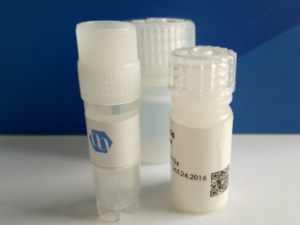$ 480.0
Quantity:50mg
In stock
Description
Product name: Melittin
Catalog#: 1725001
Organism: Honeybee
Synonyms: Allergen Api m 3,Allergen Api m IIIk,Honeybee melittin, Bee venom melittin, Forapin,GIGAVLKVLTTGLPALISWIKRKRQQ-amide,
CAS NO.: 20449-79-0
Sequence: Gly-Ile-Gly-Ala-Val-Leu-Lys-Val-Leu-Thr-Thr-Gly-Leu-Pro-Ala-Leu-Ile-Ser-Trp-Ile-Lys-Arg-Lys-Arg-Gln-Gln-NH2
Modifications: C-terminal amide,
M.W: 2846.52
M.F.: C131H229N39O31
Purity: 95%
Counter ion: Trifluoacetate
Format: Lyophilized powder
Description: Melittin is a 26 amino acid alpha helical peptide first purified from the European honeybee in 1958, which has a high affinity for lipid membranes and ultimately causes membrane lysis. Although the efficiency with which melittin binds to and disrupts membranes depends on many variables including pH, salt concentration, and membrane composition, melittin’s ability to disrupt membrane structures under myriad conditions is without question. In fact, detailed biophysical studies have revealed that melittin’s ability to bind to and disrupt model membranes actually decreases as pH decreases. Nonetheless, melittin has been shown to be capable of altering endosomal membrane integrity after cellular uptake under sub-toxic concentrations, suggesting that melittin does bind to and alter endosomal membranes despite the acidic environment. Recent reports point to several mechanisms of MEL cytotoxicity in different types of cancer cells such as cell cycle alterations, effect on proliferation and/or growth inhibition, and induction of apoptotic and necrotic cell death trough several cancer cell death mechanisms, including the activation of caspases and matrix metalloproteinases.
Uniprot ID: P01501
Usage: For Scientific Research Use Only, Not for Human Use.

